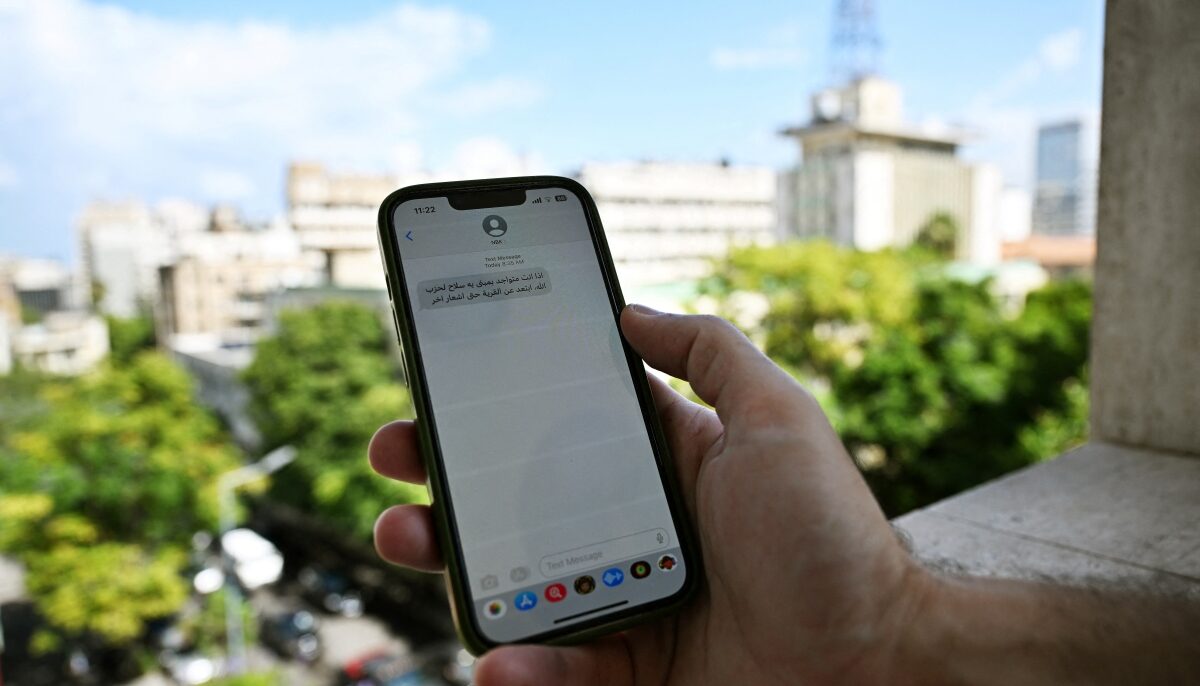For the past week, people in Lebanon have been receiving anonymous messages with threats and calls to evacuate homes in specific areas. The Israeli military also hacked radio waves, broadcasting “warning” messages while drivers were listening to their car radio.
Today, on September 23, residents received a number of messages through various platforms, including mobile text messages, phone calls from foreign or Lebanese numbers via WhatsApp, as well as calls from Lebanese numbers on mobile or landline phones.
The Israeli occupation employs this type of intimidation as part of a “psychological warfare campaign,” as witnessed in Gaza.
According to Lebanese Minister of Information, Ziad Makari, many citizens in Beirut and other areas received uniform random short messages via the landline network, urging them to “evacuate their locations.”
Makari, whose office also received these Israeli messages, said, “This method is not uncommon to the Israeli enemy,” emphasizing that work at the Ministry of Information continues as usual, and advising people not to give this issue more attention than it deserves, as the concerned authorities are closely monitoring it.
SMS Messages
The recent Israeli messages may have been sent through online applications contracted with local agencies. Typically, such messages are sent to users in a specific location by a local agency to promote a product or service, targeting people who had previously provided their phone numbers to stores.
In Lebanon, we have frequently witnessed this type of message reaching users without their consent, and journalistic reports indicated that the mobile companies Alfa and Touch sold this data to advertising agencies.
In other words, these messages could have been sent through platforms contracted with local agencies that, in turn, are contracted with telecommunications operators in Lebanon.
Messages on Messaging Apps like WhatsApp and Telegram
Sending texts via these apps is easier than sending them as SMS, as the sender can create fake WhatsApp or Telegram accounts using phone lines that can be purchased or activated online.
The sender then activates these accounts and begins sending suspicious messages, often relying on random number generators in a specific country. In this case, the occupation targets residents of a particular area with messages using the communication data it possesses.
Additionally, people are sharing WhatsApp and other groups claiming to assist with evacuations and rescues. Some of these groups were created by the Israeli occupation, which established a website and provided a link to a WhatsApp group falsely claiming to offer rescue services.
Phone Calls from Lebanese Numbers
It is not necessarily the case that calls coming from a Lebanese number with Israeli content are being made from Lebanon, nor does it imply a particular breach.
The sender may have used a technique called “masking,” which allows the caller’s number to appear as if it’s from Lebanon while operating from elsewhere. Typically, the speakers in these types of calls are machines that play a recorded message when answered.
Imad Kreidieh, head of Ogero, which manages Lebanon’s telecommunications infrastructure, told The Guardian today that “around 60,000 calls reached various areas in Lebanon, playing a pre-recorded message ordering people to evacuate their homes.”
Kreidieh explained that the Israelis “send a series of automated voice recordings via international telecommunications companies, and the system does not recognize them as Israeli calls, with most appearing as calls coming from a friendly country.”
He added that this is an “old technique” used by Israel during the 2006 war.
In certain cases, Israeli messages reach individuals that the Israeli army claims to know through signal interception rather than phone hacking. According to the technical team at SMEX, this can happen by monitoring the phone connected to the network and the internet, identifying the closest antenna to determine the location of the person connected to it, among other methods.
An Israeli drone could also intercept the signals between this antenna and all the phones connected to it, allowing the drone to gather all connected numbers and send calls and short messages to them.
Data Security and Monitoring Communications: A State Responsibility
Through a technical audit, telecommunications operators can trace the source of the calls and messages, especially those made through normal networks, such as landlines and mobile phones.
Last week, local sources reported the possibility of tracing the source of suspicious messages received by the Lebanese. Lebanese Minister of Telecommunications, Johnny Corm, announced yesterday the arrest of several individuals responsible for sending suspicious text messages to people’s phones.
These coordinated cyber infiltration attacks by the Israeli occupation proves its attempts at eavesdropping, hacking, data theft, and network intrusion. SMEX has previously exposed Israel’s capabilities in hacking data and eavesdropping on communications.
The primary responsibility lies with the Lebanese state, not individuals, as it is responsible for protecting data, tracking and monitoring these communications, and addressing the vulnerabilities, taking the necessary actions both locally and internationally.
Moreover, data protection systems are very weak in Lebanon, leaving large amounts of residents’ private data exposed or vulnerable to breaches and leaks, as SMEX has previously reported.
Media outlets should refrain from inciting panic among citizens and avoid using misleading headlines that terrorize their readers. In such times, it is preferable not to publish news, especially security-related matters, without fully verifying them and consulting experts before commenting on any event.
Finally, here are some important tips to follow in such situations:
- Do not return calls from suspicious numbers.
- Never send SMS messages to suspicious numbers.
- Do not click on any links, even if they are sent by people you know.
- Visit websites yourself by typing the address in your browser.
- If you answer a suspicious call, do not press any numbers on the phone keypad.
- Report such calls to the security authorities.
- Do not join WhatsApp or other groups unless you know who manages them.
- Disable the option to be added to WhatsApp groups except by your contacts: go to Settings > Privacy > Groups > My contacts only.



